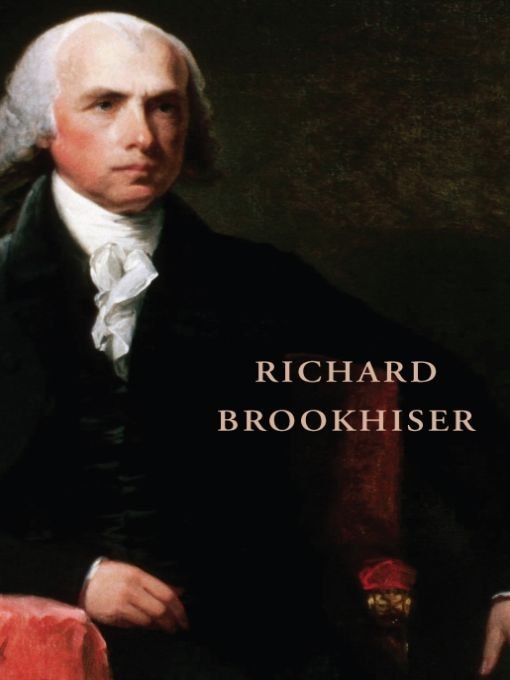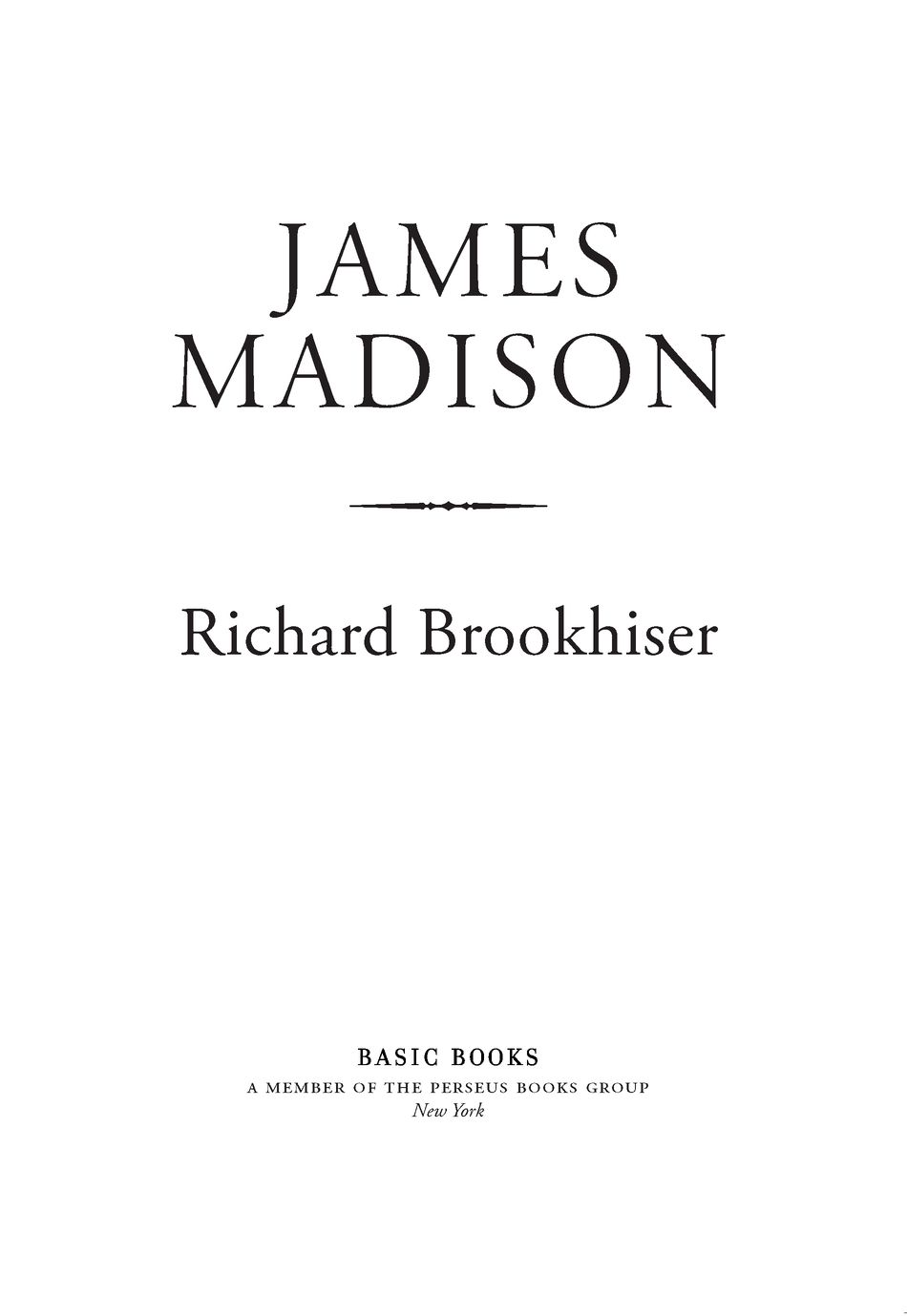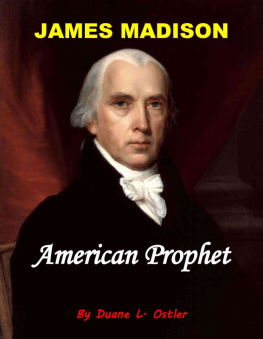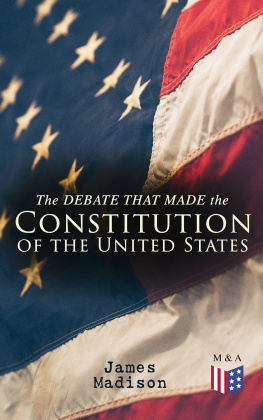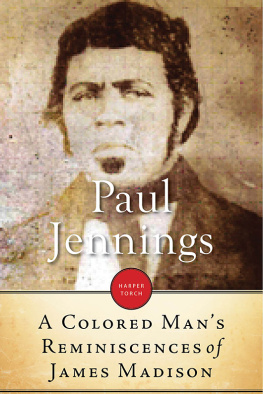Table of Contents
ALSO BY RICHARD BROOKHISER:
Right Time, Right Place
George Washington On Leadership
What Would the Founders Do?
Gentleman Revolutionary: Gouverneur Morris
The Rake Who Wrote the Constitution
Americas First Dynasty: The Adamses 17351918
Alexander Hamilton, American
Rules of Civility
Founding Father: Rediscovering George Washington
Way of the WASP
The Outside Story
FOR
Bert and Nina Smiley
A NOTE ON SPELLING AND USAGE
Eighteenth-century writing had somewhat different rules than todays, and even the well educated followed them rather loosely. Proper names were often spelled whimsically. In his notes on the Constitutional Convention, Madison wrote of Govurneur (Gouverneur) Morris, Oliver Elseworth (Ellsworth), and Roger Sharman (Sherman). William Pierce, meanwhile, wrote of Mr. Maddison.
All spelling and punctuation have been modernized in what follows.
American presidents in Madisons lifetime sent ministers abroad, not ambassadors, and picked secretaries of departments, not a cabinet. The newest capital of the United States was called Washington City, not Washington. I have sometimes preferred anachronism to quaintness. The Republican Party that Jefferson and Madison founded is the ancestor of todays Democrats; the modern GOP is a different, later organization.
ACKNOWLEDGMENTS
Michael C. Quinn, president of the Montpelier Foundation, and all his colleagues have been of great help. Michael Pack and Tracy Simmons gave me good advice.
The generosity of the John Simon Guggenheim Memorial Foundation helped me complete this book. Akhil Amar, Michael Pack, and Tracy Simmons gave good suggestions and advice.
I would like to thank my editor, Lara Heimert, my agent, Michael Carlisle, and my wife, Jeanne Safer.
Introduction
August 24, 1814, began as a typical summer day in Washington: bright and cloudless, promising heat and humidity as the day wore on. For years, James Madison, the president, had fled high summer in Washington and other low-lying cities for the healthier air of his inland home in the Virginia Piedmont. But this August his presence was required in the capital. America had been at war with Britain for two years. Mr. Madisons warhe had asked Congress to declare ithad been fought along the Canadian border; against Indians on the frontier; on the high seas. Now the war was coming home.
A week earlier, on August 17, twenty British ships carrying 4,500 troops had anchored in the Patuxent River in Maryland, only thirty-five miles away from Washington to the southeast. The president had suggested pelt[ing] the enemy from the start with light troops. But nothing was done. Instead the British disembarked and made a leisurely stroll up the Maryland countryside, perhaps bound for Baltimore, a booming port, the third-largest city in America. Secretary of War John Armstrong thought so: they would certainly not come to Washington, he said; what the devil will they do here?... No, no! Baltimore is the place, sir.
But now the British had made a left turn. Just hours earlier, at midnight, the president had gotten a note from the field: The enemy are in full march for Washington.... Destroy the bridges.... Remove the records.
When James Madison had been a congressman, a quarter century earlier, he had helped move the nations capital from New York to an undeveloped site on the Potomac. The new capital was still hardly more than a small town, stretching from Rock Creek in the west to Capitol Hill in the east: a ragged arc, decorated by a few incongruous public buildings, as if built by ancients or aliens. In the midst of it stood the White House. Madison was the third president to have lived there. John Adams, whom Madison scorned, had spent the dismal last days of his administration in a shell inside a construction site. Thomas Jefferson, whom Madison loved above all men, had run it like a Virginia plantation house, hosting intimate dinners for congressmen and diplomats with good food, excellent wine, and his own sparkling conversation. Madisons White House was grander yet, thanks to his wife, Dolley, who brightened it with banquets and soirees, red velvet curtains and green gilt-edged china, a piano and a macaw.
Now, a little before eight oclock in the morning on August 24, a message came to this republican palace from Gen. William Winder, commander of the Potomac military district. It was addressed to Armstrong, but the president opened it himself. The general wanted advice, as fast as possible; Madison mounted his horse and left the White House for Winders headquarters at the Navy Yard.
The Navy Yard was a mile south of town, on the Eastern Branch of the Potomac, now called the Anacostia River. There was a bridge there, about where the Eleventh Street bridge is now. All morning, Madison conferred with officers and cabinet secretaries, who came and went. The three most important represented all the types a president typically finds about him in moments of crisis: those who might help, those who wont, and those who cant.
James Monroe, secretary of state, was a Revolutionary War veteran who had known Madison for decades; he had quarreled with him and reconciled with him. He was the man who had sent the midnight warning about the British march on the capital, and he had thrown himself into the effort to defend it. He had talent and energy, and had decided to serve Madison.
John Armstrong, another veteran of the Revolutionary War, had been appointed secretary of war six months after hostilities had begun, to retrieve the disasters of an incompetent predecessor. In a year and a half on the job, he had cleared out deadwood and promoted fresh faces, but he had also fallen out with the president. He disliked Madison personally and disagreed with him strategically, ignoring Madisons suggestions to hit the enemy as soon as they landed and instead focusing all his attention on Baltimore. Armstrong, too, had talent and energy, and had decided by August 1814 to use neither on Madisons behalf.
The man immediately responsible for the capitals defense was William Winder, a thirty-nine-year-old former lawyer, who had been in the army for only two years. He had received his current assignment in July, largely because he was the nephew of the governor of Maryland. He had been unceasingly busy. The innumerably multiplied orders, letters, consultations, and demands which crowded upon me... can more easily be conceived than described, he wrote. Yet he had accomplished nothing. He had energy, and no talent at all.
At ten oclock word reached the Navy Yard that the British were making for Bladensburg, Maryland, a village northeast of the capital. There was a gap in the hills there, and a short bridge over the Eastern Branch, five miles up from the Navy Yard, where the stream is narrow. It was the natural route for attacking Washington from the east. Monroe rode off to alert whatever American troops were already there. Winder followed with reinforcements.
Armstrong came to the Navy Yard only after Monroe and Winder left. Madison asked him whether he had any advice to give. He didnt but added that, since the battle would be between American militia and British regulars, the former would be beaten. Madison suggested that Armstrong really should take part in the coming engagement ( [I] expressed to him my concern and surprise at the reserve he showed, was how Madison recalled it). Armstrong answered that if Madison thought it proper, he would go off to Bladensburg, too.

